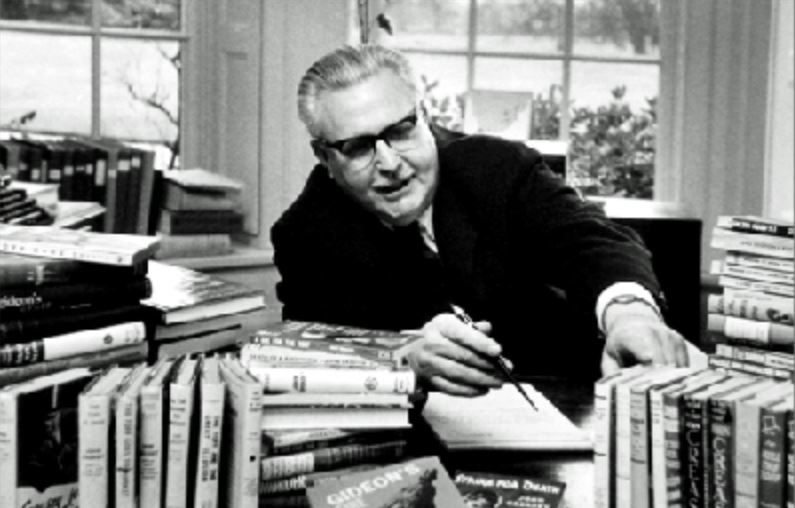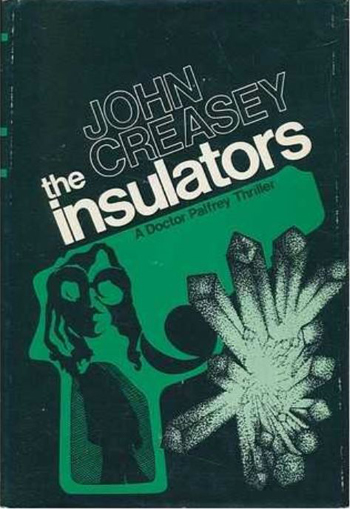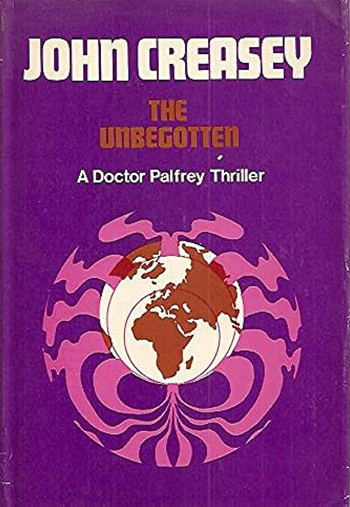by Pedro Blas González (July 2023)

Early Morning, May, Donald Sultan, 1986
Surely the lesson which follows is that happiness is born out of goodness; that we need to find and have access to an illimitable store of goodness before we can find universal happiness. The goodness must come first. —John Creasey
It is difficult to begin an essay about a writer who has published over six hundred novels, using over 28 pen names: British writer, John Creasey 1908-1973. This year marks the 50th anniversary of Creasey’s death.
 I would be burying the lede if I placed too much emphasis on the number of books Creasey wrote. Instead, Creasey, like the French writer Georges Simenon, who published over four hundred books himself, possessed poignant natural psychology.
I would be burying the lede if I placed too much emphasis on the number of books Creasey wrote. Instead, Creasey, like the French writer Georges Simenon, who published over four hundred books himself, possessed poignant natural psychology.
Creasey’s perspicuity is a rare quality that is lacking in postmodern writers and thinkers, or is suppressed through censorship. The seminal aspect of his psychical prowess is an uncanny ability to penetrate into human nature.
To write the number of novels that Creasy published, in relation to other writers, it is not enough to have original plotlines. If that were the sole ingredient needed to enjoy such a prolific and prosperous writing career, after a while, all his stories would resemble each other. How did Creasey avoid that pitfall? In 1967 a Times Literary Supplement critic wrote: “There may come a time when all the possibilities of crime fiction will have been fully explored. Mr. Creasey’s inventive powers make that prospect seem remote.”
One ingenious way that Creasey’s novels remained fresh, his stories ever capable of engaging readers, was through his use of pen names. For a writer who undertook a panoramic view of man and society, Creasey’s pen names serve to redirect the scope and topics of his stories in a manner that competent writing alone cannot achieve. His pen names enabled him to visit different places and venues, develop vastly different characters, and explore situations that are not confined to or limited by any one of his subgenres and writing styles.
 Another key ingredient of Creasey’s success as a writer is the creation of his many book series. Not only did Creasey use over 28 pen names, he created an assortment of detectives, operatives, amateur sleuths, scientists and others, each possessing a singular rhyme and reason that made each series different. The different series were published by different publishers. This enabled readers, who might have greater affinity for one character over others, to explore many of his books.
Another key ingredient of Creasey’s success as a writer is the creation of his many book series. Not only did Creasey use over 28 pen names, he created an assortment of detectives, operatives, amateur sleuths, scientists and others, each possessing a singular rhyme and reason that made each series different. The different series were published by different publishers. This enabled readers, who might have greater affinity for one character over others, to explore many of his books.
Apart from the importance of employing imaginative and nuanced storylines that create effective suspense and pacing in novels, memorable literary works must do more than entertain. Creasey’s natural psychology begs the question of his mental acuity regarding human nature, the human person, and society. His mature stories pierce the human psyche, peeling away the strata of ambitions, motivations and thought process that fuel human action, consequently offering poignant wisdom about the human condition.
Good, God and Man
In 1967 Creasey published Good, God and Man: An Outline of the Philosophy of Self-ism, a nonfiction book that is little-known today. This is an instructive book for several reasons. First, readers of fiction rarely encounter their favorite authors as writers of philosophy books. Secondly, and most importantly, Good, God and Man is Creasey’s attempt to describe human nature in relation to virtue.
Because he reflects on man, society, youth, ageing, ambitions, idealism and realism, the book sheds interesting light on his novels. In a chapter entitled “A Little Learning…” the author discusses the difference between learning and wisdom.
Creasey’s aversion to ‘scholastic training’ is instructive. He writes, “Often, I found they conflicted with my experience of human behavior and reactions, as if the authors were discussing people of a kind I knew nothing about—and who, to me, did not exist.” Creasey explains that his most effective learning came from experience, “living—by travelling, by looking about me.”
At some point, thoughtful writers who have something of substance to say consider the possibility that ‘it has all been said before.’ Yet, this can be a tenuous and crippling road that leads to self-doubt.
 Part of a writer’s insight into what has been said and written before bears on the objective essence of human nature. This is an essentialist’s recognition that while the essence of man and human reality do not change, regardless of the protestation of ideologues, expression of the latter finds new avenues to showcase the permanent things. This is the purview of writers and thinkers who contribute to our understanding of the human condition, regardless of genre and pressure placed upon them by timely social/political fashions.
Part of a writer’s insight into what has been said and written before bears on the objective essence of human nature. This is an essentialist’s recognition that while the essence of man and human reality do not change, regardless of the protestation of ideologues, expression of the latter finds new avenues to showcase the permanent things. This is the purview of writers and thinkers who contribute to our understanding of the human condition, regardless of genre and pressure placed upon them by timely social/political fashions.
The Fallacy of Proof by Repeated Assertion
Let us counter the insights of astute writers in lieu of the arm-twisting of reality that is the hallmark of ideological critics. To deny the existence of human nature, negate objective values, and assume that everything is new under the sun in postmodernity places so called progressive critics in the category of being promoters of fallacious, tried-and-failed values, while re-packaging these notions repeatedly, again and again and … This is the fallacy of repeated assertion.
Creasey points out this fallacy: “Often what was presented as a ‘new’ thought or concept proved to be only a restatement of what had been said many times before.”
The Many Faces of Creasey’s Characters
There is something alluring about the imagination of a writer that can create multiple series of books. Each of Creasey’s series has a singular flair and style that defines it. He also wrote many stand-alone novels. Creasey’s best-known series are:
- The Baron Detective Series. John Creasey writing as Anthony Morton. In this series, John Mannering—the Baron—is an antiques dealer.
- The Commander George Gideon of Scotland Yard Series. Creasey writing as J.J. Marric. Gideon is a policeman. Police procedural novels; Gideon is respected by his colleagues.
- The Doctor Palfrey Series. Creasey writing as himself. Doctor Palfrey, a physician, is head of Z-5, a counter espionage agency that uncovers totalitarian and international criminal organizations.
- The Inspector West Series. Creasey writing as himself. Roger West goes from being Inspector to Superintendent of Scotland Yard in the series.
- The Toff Series. Creasey writing as himself. The Toff is the Honorable Richard Rollison, an upper-class crime sleuth.
- The Superintendent Folly Series. Creasey writing as Jeremy York.
 The Doctor Palfrey Series is particularly enticing. This series can be classified as science fiction, mystery, and adventure-suspense. The protagonist is an unassuming medical doctor who, after encountering malignant plots by evil totalitarian organizations and individuals, is hopeful that perhaps man can learn from the experience of coming face to face with evil in order to identify it in the future. Doctor Palfrey’s prudence keeps him grounded in reality.
The Doctor Palfrey Series is particularly enticing. This series can be classified as science fiction, mystery, and adventure-suspense. The protagonist is an unassuming medical doctor who, after encountering malignant plots by evil totalitarian organizations and individuals, is hopeful that perhaps man can learn from the experience of coming face to face with evil in order to identify it in the future. Doctor Palfrey’s prudence keeps him grounded in reality.
Doctor Palfrey is wise. However, he does not show his cards until forced to by the malignancy of the villains he exposes. What makes Doctor Palfrey interesting is the narrator’s acerbic description of the world and society—a world that has not changed—since the time the Doctor Palfrey Series was published, from 1942 to 1979.
Consider what Doctor Palfrey says about the totalitarian criminals that run the world: “These threats were often made by individuals or groups of individuals who had acquired some single weapon with which they could attack the world.” He goes on to add: “There had been a great variety of such threats, from megalomaniac who saw the world as theirs, to idealists who believed only they could guide mankind to happiness.” Can we recognize any of the power brokers that he describes in our own time?
Two late entries into this series are fine examples of the postmodern, ideologically-driven threats that doctor Palfrey contends with: The Unbegotten (1971) and The Insulators (1973).
Readers can debate the qualities they find most alluring and enjoyable in their favorite Creasey character; I cast my vote for Doctor Palfrey. This character is humble and noble.
At first, Doctor Palfrey appears incredulous about the degree of evil that he eventually battles. This is a staple of people of good will. As the stories progress, Doctor Palfrey becomes introspective. His prudence makes him taciturn regarding how much information and wisdom he can share with others. He is constantly surprised and awed by the scope of criminality and evil that he encounters in postmodern life.
Table of Contents
Pedro Blas González is Professor of Philosophy in Florida. He earned his doctoral degree in Philosophy at DePaul University in 1995. Dr. González has published extensively on leading Spanish philosophers, such as Ortega y Gasset and Unamuno. His books have included Unamuno: A Lyrical Essay, Ortega’s ‘Revolt of the Masses’ and the Triumph of the New Man, Fragments: Essays in Subjectivity, Individuality and Autonomy and Human Existence as Radical Reality: Ortega’s Philosophy of Subjectivity. He also published a translation and introduction of José Ortega y Gasset’s last work to appear in English, “Medio siglo de Filosofia” (1951) in Philosophy Today Vol. 42 Issue 2 (Summer 1998). His most recent book is Philosophical Perspective on Cinema.
Follow NER on Twitter @NERIconoclast








One Response
Interesting tour of Creasey. Thanks.